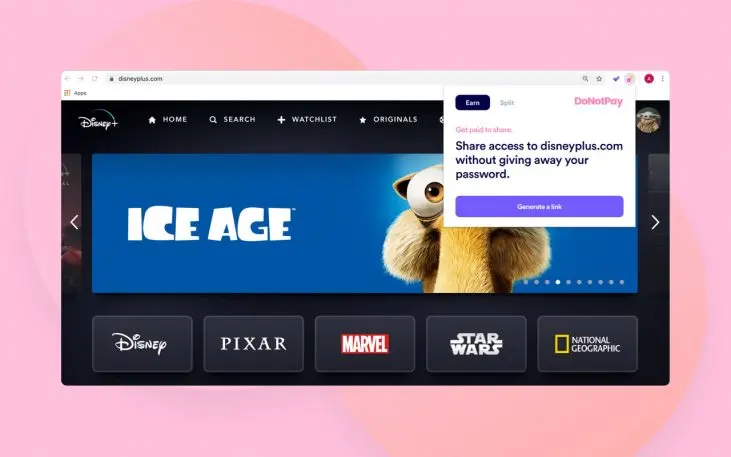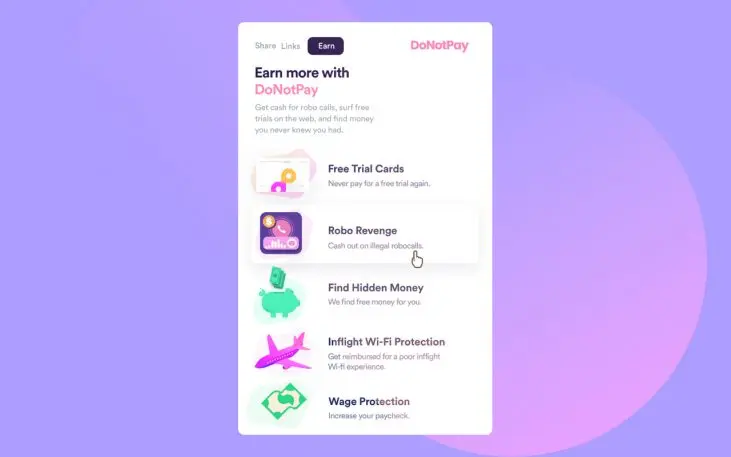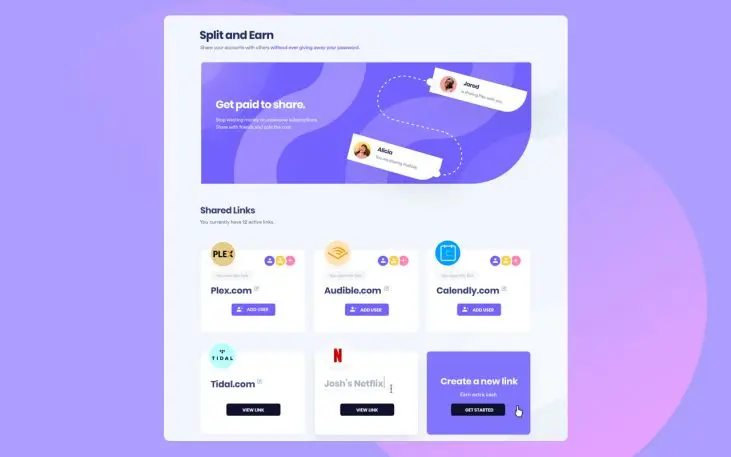DoNotPay is a startup that seems to delight in corporate trolling. Among its patchwork of services are a virtual credit card that can generate endless free trials, a fast food receipt scanner that automatically fills out surveys for free food, and an automated complaint system that secures reimbursements for shoddy in-flight Wi-Fi.
Now, DoNotPay has devised a way to share Netflix and other subscription services without showing your password to anyone else. By installing the startup’s free Chrome extension, you can generate links that other people can use to access your subscriptions. Instead of sharing the actual password, DoNotPay uses cookies to transfer your browsing session to other users’ computers, effectively fooling services such as Netflix and Hulu into thinking you’ve just logged in through another Chrome tab. I’ve tried it, and it works as advertised.
Joshua Browder, DoNotPay’s founder and CEO, says the subscription sharing feature is a response to the proliferation of streaming services that each have their own exclusive content silos.
“It’s ridiculous,” Browder says. “You shouldn’t have to pay $100 a month just to access what you could get before for much cheaper.”
Update: Google has now removed the DoNotPay extension from the Chrome Web Store.
Password sharing, without the password
Sharing actual passwords for streaming services and other subscriptions seems like a fine idea until it becomes a security liability. Too often, people reuse the same or similar passwords across multiple sites, so sharing one login can compromise others. You also can’t un-share a login or prevent people from re-sharing without resetting your current password, which is a hassle. This becomes a problem when couples break up or roommates move out.
“If they’re no longer your friend, they shouldn’t have your password,” Browder says. “This is a lot more secure.”
DoNotPay’s solution involves generating a browser cookie similar to the ones that websites use to keep you logged in. The DoNotPay extension encrypts the cookie and associates it with a web link that you can share with others. When another DoNotPay user opens that link in their web browser, the extension loads the associated website, decrypts the cookie, and signs in with the login information it contains. Neither the recipient nor DoNotPay gets to see the login information along the way.

The main advantage to this approach is that it lets users revoke account access without having to reset their own passwords. Through DoNotPay’s website, you can see a list of all shared subscriptions and can either remove individuals or delete the sharable link outright.
“The best thing about these cookies is that you’re in control, so with one click, you can disable the cookie and stop it from ever working,” Browder says.
There is a downside, though: Because DoNotPay’s solution depends on a web browser extension, it doesn’t work on phones, tablets, smart TVs, or streaming devices. Browder says mobile support might be possible in the future for services that offer mobile websites instead of just apps, and you can also use Chromecast to send video from a computer to TV screens, but these are workarounds at best. For unrestricted access, you’ll still have to share passwords the old-fashioned way.
DoNotPay has also implemented one restriction of its own: Each subscription can only be shared with up to five other people. Browder says he doesn’t want to enable widespread sharing of a single account, and most streaming services have limits on how many devices can stream at the same time anyway.
“If you’re splitting it with more than five people, it’s probably not legitimate,” he says.
The business of subscription sharing
Before launch, DoNotPay was experimenting with letting users charge their friends for subscription access. If you were paying $13 per month for Netflix, for instance, you could require each friend to chip in a few bucks every month, with DoNotPay collecting and distributing the payments.

Browder says DoNotPay ultimately scrapped that feature for a variety of reasons. He acknowledges that letting users monetize their subscriptions might’ve raised legal issues, but more importantly, it would have sullied the idea of account sharing as a communal act. In its place, DoNotPay has added a way for users to barter their accounts without exchanging money, so you might trade Netflix for Hulu, or The New York Times for The Washington Post.
“We’re making it less about money and more about community and friends,” Browder says.

This does leave DoNotPay’s subscription sharing without a direct business model, but the hope is that users will eventually discover DoNotPay’s paid services, which include help with disputing traffic tickets and seeking settlements from robocallers by threatening to sue. DoNotPay has started rolling up some of those services into a $3-per-month subscription and plans to advertise it through its Chrome extension. Browder notes that DoNotPay’s terms of service commit to never selling or renting users’ personal or anonymized data.
Although DoNotPay’s approach is novel, it probably won’t be the last attempt at turning password sharing into a business. Just a few weeks ago, I wrote about a service called Jam, which acts like a password manager optimized for sharing subscriptions. It’s not hard to imagine existing password management tools adding similar features, or even more startups popping up to capitalize on the overwhelming number of subscription services.
Of course, those services could always try to crack down on account sharing, but doing so is trickier than it might seem. Streaming providers are wary of making any moves that might annoy legitimate customers, and they might even benefit from some password sharing at the margins of their business. If someone who’s freeloading on an account wasn’t going to subscribe anyway, they can at least contribute some ad revenue or put pressure on their friends not to cancel.
“I think they see it as a retention tool. I think they see it as a marketing tool,” Browder says. “And as long as it doesn’t get out of control, they’ll allow it to happen because it’s actually more beneficial for them.”
Recognize your brand’s excellence by applying to this year’s Brands That Matter Awards before the early-rate deadline, May 3.
